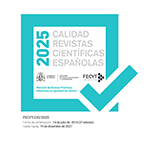Irony and Parody in a Spanish Translation of Fowles’ "The French Lieutenant’s Woman": A Relevance-Theoretical Approach
Abstract
This paper seeks to explore the translation of irony and parody. The theoretical framework followed will be relevance-theory, which has highlighted that the expression of a certain attitude may be common to these two figures. The work under analysis will be a Spanish rendering of Fowles' The French Lieutenant’s Woman, which criticism has regarded as a parody of nineteenth-century Victorian fiction. It will be assumed that for readers to be able to cope with the meaning of parody and irony, they will have to go beyond the propositional content expressed in the utterances in which these resources are found. Furthermore, their translation will necessarily require strategies that go beyond the “literal” level of the words through which irony and parody are expressed. Our contention is that the proposals put forward by relevance theory may be useful in this respect, since they stress the importance of the inferential recognition of the speaker's communicative intention. Both such recognition and its reflection in the target text, in such a way that it requires no extra processing effort from the readership are the main aspects to be faced by the translator.
Downloads
Article download
License
In order to support the global exchange of knowledge, the journal Complutense Journal of English Studies is allowing unrestricted access to its content as from its publication in this electronic edition, and as such it is an open-access journal. The originals published in this journal are the property of the Complutense University of Madrid and any reproduction thereof in full or in part must cite the source. All content is distributed under a Creative Commons Attribution 4.0 use and distribution licence (CC BY 4.0). This circumstance must be expressly stated in these terms where necessary. You can view the summary and the complete legal text of the licence.









